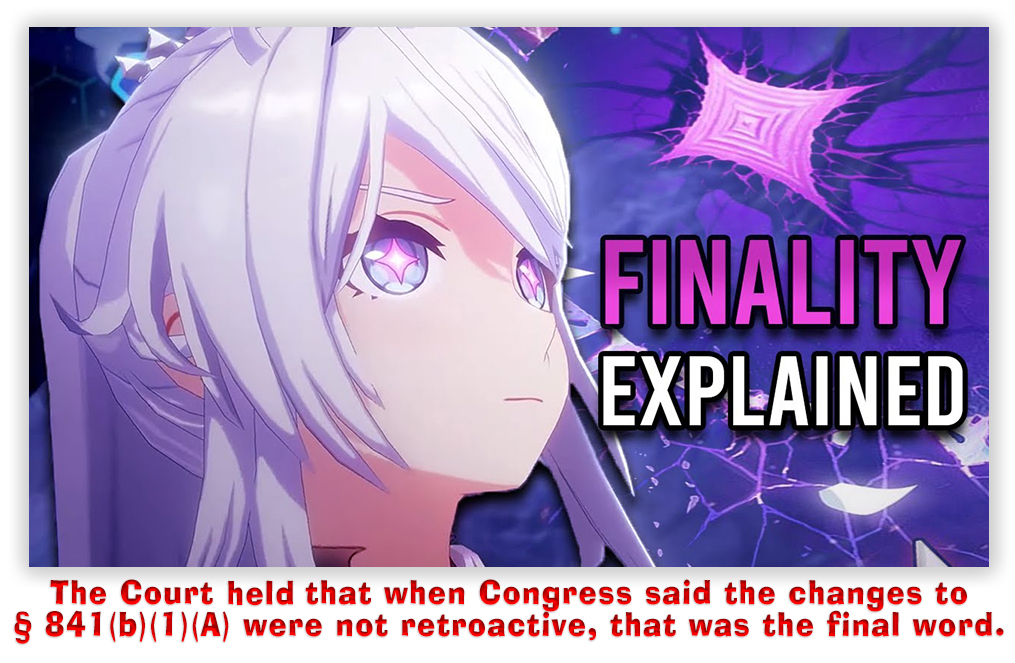We post news and comment on federal criminal justice issues, focused primarily on trial and post-conviction matters, legislative initiatives, and sentencing issues.

WHAT CONGRESS HAS ORDAINED, LET NO SENTENCING COMMISSION PUT ASUNDER
 Compassionate release took it on the chin again in the 11th Circuit this week, as a Southern District of Florida district court ruled yesterday in a lengthy opinion that the United States Sentencing Commission lacked the authority to rule that a nonretroactive change in the law could provide a basis to reduce the length of a grossly over-length sentence that was proper when imposed but would be improper under current law.
Compassionate release took it on the chin again in the 11th Circuit this week, as a Southern District of Florida district court ruled yesterday in a lengthy opinion that the United States Sentencing Commission lacked the authority to rule that a nonretroactive change in the law could provide a basis to reduce the length of a grossly over-length sentence that was proper when imposed but would be improper under current law.
A little background: Under 18 USC § 3582(c)(1), a federal prisoner is entitled to ask the sentencing court to reduce his or her sentence. An inmate seeking such a reduction (commonly if imprecisely known as “compassionate release”) must show that “extraordinary and compelling” reasons exist for grant of the reduction. What constitutes an “extraordinary and compelling” reason is defined in the first instance by United States Sentencing Commission.
(The prisoner also must show that the reduction being sought takes into consideration (whatever that means) the sentencing factors of 18 USC § 3553(a), but we can discuss that issue another day).
When the Sentencing Commission adopted a new policy statement on sentence reduction motions 15 months ago, it provided a laundry list of circumstances that qualify in Guideline § 1B1.13(b). The most contentious item on the list is Item (b)(6), a provision that a “change in the law” can sometimes provide a basis for a reduction.
 Gilberto Chineag was sentenced to life in prison after being ensnared in a “stash house sting” some 25 years ago. Two prior state drug convictions – which Gil possessed – were all that were required under 21 USC § 841(b)(1)(A) to require the court to lock Gil away for the rest of his natural life.
Gilberto Chineag was sentenced to life in prison after being ensnared in a “stash house sting” some 25 years ago. Two prior state drug convictions – which Gil possessed – were all that were required under 21 USC § 841(b)(1)(A) to require the court to lock Gil away for the rest of his natural life.
A quarter century later or so, Gil asked his court to reduce his sentence to time served, arguing that the First Step Act’s (FSA’s) change in § 841(b)(1)(A) left his sentence at 21 to 27 years instead of life and thus qualified under Guideline 1B1.13(b)(6) as an extraordinary and compelling reason for a sentence reduction. In a 40-page opinion issued yesterday, Judge Rodolfo Ruiz II disagreed, holding that the Sentencing Commission lacked the power to declare that a change in the law that Congress did not make retroactive could ever be an “extraordinary and compelling” reason under § 3582(c)(1)(A) for a sentence reduction.
While Congress never exactly denied the Sentencing Commission the right to rely on a change in the law as an “extraordinary and compelling” reason, it did say in the FSA that the amendments to § 841(b)(1)(A) “shall apply to any offense that was committed before the date of enactment of this Act, if a sentence for the offense has not been imposed as of such date of enactment.” Judge Ruiz reasonably read this provision as excluding application to offenses like Gil’s that had been sentenced years before the FSA was adopted.
Judge Ruiz held adoption of 1B1.13(b)(6)
exceeds the scope of the Commission’s delegated authority in allowing courts to consider expressly nonretroactive changes in law, like section 401(a) of the FSA, as ‘extraordinary and compelling reasons’ for a sentence reduction… The Court does not doubt the well-intentioned policy rationale that led the Commission to promulgate this Policy Statement. And the Court recognizes the hard work undertaken by the Commission to cabin the terms of section 1B1.13(b)(6)… A court may consider a change in law only if (1) the defendant has served at least ten years of their sentence; (2) there would be a “gross disparity” between the sentence being served and the sentence likely to be imposed after the change in law came into effect; and (3) individualized circumstances demand it. This clearly evinces a good-faith effort on the Commission’s part to narrowly tailor the class of defendants who would be eligible for a sentence reduction. But a textual good policy cannot overcome clear text. If a statute, like section 401(a) of the First Step Act, is clearly nonretroactive, it cannot be rendered retroactive by simply adding the label “extraordinary and compelling.
 The court observed that “Congress did not vitiate prior law or cast doubt on the thousands of lawful, final sentences that had been previously established pursuant to § 841(b)(1)(A),” but rather only concluded that the policy underlying high mandatory minimum sentences in to § 841(b)(1)(A) should be reduced. “The Court presumes that Congress says what it means and means what it says,” Judge Ruiz wrote, “And if Congress explicitly chooses to make a statute nonretroactive, it would be truly abnormal and extraordinary—in every sense of the word—for a court to poke around that statute to find imaginary exceptions.”
The court observed that “Congress did not vitiate prior law or cast doubt on the thousands of lawful, final sentences that had been previously established pursuant to § 841(b)(1)(A),” but rather only concluded that the policy underlying high mandatory minimum sentences in to § 841(b)(1)(A) should be reduced. “The Court presumes that Congress says what it means and means what it says,” Judge Ruiz wrote, “And if Congress explicitly chooses to make a statute nonretroactive, it would be truly abnormal and extraordinary—in every sense of the word—for a court to poke around that statute to find imaginary exceptions.”
This decision is only a district court opinion, not binding on any other court. But its detail and scholarship – as well as other court’s opinions as to the efficacy of Guideline 1B1.13(b)(6) – suggest that this issue will not be settled short of the Supreme Court.
Ohio State University law professor Doug Berman, writing yesterday in his Sentencing Law and Policy blog, questioned Judge Ruiz’s conclusion that Congress did not intend that the Commission let nonretroactive sentencing law changes sometimes trigger review of a harsh sentence. He wrote that “[i]t makes perfect sentence to me that Congress would conclude, when passing major sentencing reductions in the First Step Act, that it ought not give thousands of defendants an unlimited, complete, broad legal right to retroactive sentence reductions (which in many cases might require plenary resentencings), but still would want the expert sentencing agency to set the terms of possible case-by-case sentence reductions attentive to the significant statutory changes it had just enacted.”
United States v. Chineag, Case No. 1:01-cr-607 (S.D. Fla. February 6, 2025)
Sentencing Law and Policy, Notable lengthy new district court opinion rules US Sentencing Commission lacked authority to authorize sentence reduction based in part on “changes in law” (February 6, 2025)
– Thomas L. Root

